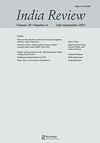Communalized force: the 1947 partition violence in Punjab and role of law enforcers
IF 0.6
3区 社会学
Q3 AREA STUDIES
引用次数: 0
Abstract
ABSTRACT The communalization of the police, which resulted from the embittered political situation among the rival communities, was a prominent feature of the Partition violence in 1947. Instead of safeguarding minority communities under attack, the police largely condoned and contributed to the violence, not because of sympathies with their coreligionists, but because they could act with impunity in an environment of insubordination and administrative breakdown in the process of the transition of power of the outgoing British colonial state. This article will show that the absence of a restraining authority, impunity from the law at the point of transitional state-created conditions of violence and the participation of law enforcement agencies led to the widespread violence. This documentation is done by accessing previously unexplored police First Information Reports (FIRs) lodged at local police stations at the time, and the reports of the Punjab Special Branch Intelligence Police from the Roberts Club Archives (RCA), Lahore. The analysis not only contributes to recent scholarship that focuses on the ‘new history’ of Partition studies but also provides an intriguing insight into the role of law enforcement agencies in mass violence.社区化力量:1947年旁遮普邦的分治暴力和执法者的作用
摘要警察社区化是1947年分治暴力事件的一个突出特点,它源于敌对社区之间的政治局势。警方并没有保护受到攻击的少数民族社区,而是在很大程度上纵容并助长了暴力行为,这并不是因为同情他们的核心宗教主义者,而是因为在即将离任的英国殖民国家权力过渡过程中,他们可以在不服从命令和行政崩溃的环境中逍遥法外。这篇文章将表明,缺乏限制机构、过渡国家不受法律约束创造了暴力条件以及执法机构的参与导致了广泛的暴力。该文件是通过访问当时提交给当地警察局的以前未经探索的警察首次信息报告(FIRs)以及拉合尔罗伯茨俱乐部档案馆(RCA)的旁遮普特别分局情报警察的报告来完成的。这一分析不仅有助于最近关注分治研究“新历史”的学术研究,还为执法机构在大规模暴力中的作用提供了有趣的见解。
本文章由计算机程序翻译,如有差异,请以英文原文为准。
求助全文
约1分钟内获得全文
求助全文

 求助内容:
求助内容: 应助结果提醒方式:
应助结果提醒方式:


